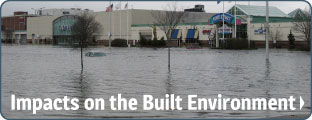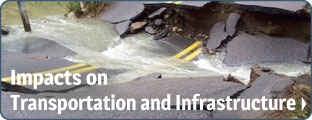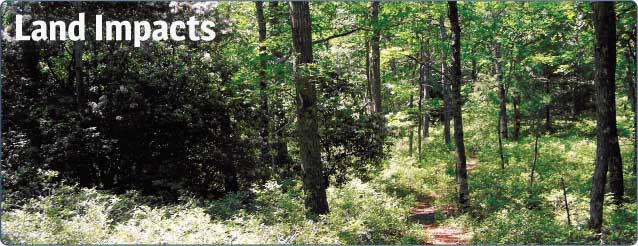
Photo Credit: Claudia Swain, South Kingstown Land Trust
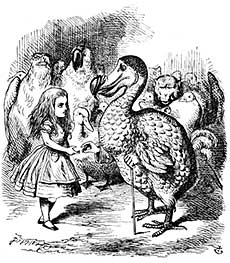
It can't happen here? Like Alice's dodo bird becoming extinct, no one ever imagined how long-term impacts of climate change might affect the environment for many living creatures.
Illustration by John Tenniel.
When Terra isn’t Quite So Firma
The most telling changes — and most evident to those who are paying attention — brought on by a warming climate may be on land.
Lengthened or abbreviated agricultural growing seasons, altered reproductive cycles, and shifts in the progress of the food chain and the natural flow of life on earth as we now know it may see Mother Nature being thrown a Major League curveball. We can only hope that Mr. Darwin’s faith in the ability to successfully adapt to change holds true. Regardless, evolution is in the self-interest of the individual creatures, not necessarily for the good of humankind.
Subtle Changes, Major Impacts
With the Northeast heating at a rate of 0.5 degrees per decade since 1970, and winter temperatures rising even faster — 1.3 degrees per decade between 1970 and 2000 — there is a link between this warming and many other changes across the region. However, whether they are beneficial or harmful will be determined over time.
Impacts on Trees (Adobe Acrobat)
Invasive Species (Adobe Acrobat)
Climate Change and Rhode Island's Dams: A Damnable Choice (Adobe Acrobat)
Shifts in the Daily, Monthly and Yearly Routine(s)
-
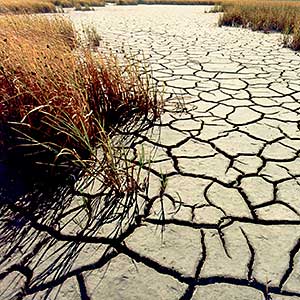 Photo Credit: U.S. Geological Survey
More frequent days with temperatures above 90 degrees. Which crops will burn out? What crops could and will replace them? The U.S. has just experienced the third hottest summer on record.
Photo Credit: U.S. Geological Survey
More frequent days with temperatures above 90 degrees. Which crops will burn out? What crops could and will replace them? The U.S. has just experienced the third hottest summer on record. - A longer growing season; but for which plants, and will that be good or bad? And what about those that require cooler temperatures to thrive?
- Earlier first-leaf and first-bloom dates for plants. And a prettier Easter Parade? But what about that pesky phenology (USA National Phenology Network) the link between time and natural cycles? What if a particular plant is critical food for a migrating species that shows up too late to feed on its leaves? And what if that species spreads that plant’s seed through its droppings? And what if that plant provides a major source of silage for animals that feed humans? We can see the circle starting to disintegrate, without knowing the eventual outcomes.
- Less precipitation falling as snow and more as rain. February showers bring March flowers? And how much is that season ski pass worth now?
- Reduced snowpack and increased snow density. This doesn’t just mean fewer powder days on the slopes. Less snow on the ground increases warming because the exposed ground absorbs more of the sun’s radiation than snow-covered ground thereby driving additional snowmelt.
- Less snowpack means less water entering streams when the snow melts in the spring. The changing temperatures could also result in the snow melting earlier in the year than what we currently experience. So, reduced snowpack that is melting earlier in the year could mean big changes for our rivers and streams and the animals that live there. Have Atlantic salmon been informed about moving up their migration schedule? Plan on the spring peepers beginning their serenades earlier and the serious dating and mating of frogs to begin before the senior prom.
- Vernal (seasonal, naturally forming) ponds, a key habitat for wood frogs and Climate change will alter the range of habitats and where plants and animals can live. It will also exacerbate other existing ecological stressors but how much and how fast is still unclear.salamanders, are vulnerable because they are tied to precipitation cycles, which are tied to temperature changes. Temperature determines which species might hatch in the pond but the pond must also last long enough for species to mature and produce viable eggs. More sporadic precipitation and increased evapotranspiration (evaporation and water release from plants) would cause the vernal ponds to dry up earlier in the season and stay dry longer. That’s like closing up shop before everyone is ready to go.
- Climate change will alter the range of habitats and where plants and animals can live. It will also exacerbate other existing ecological stressors but how much and how fast is still unclear. If enough changes occur, an animal that you are used to seeing may die or move out of the area because it just cannot tolerate living in the area anymore. If this occurs, there is the added risk of an aggressive animal moving into the area, an invasive animal that may cause damage just by being there. (See “Invasives Species” link above.)
- Existing stressors on the terrestrial environment include human development (new buildings and infrastructure), invasive species (such as Asian longhorn beetle and water chestnuts — the latter not nicely peeled and sliced in a can, but equipped with thorns that can easily puncture the foot of an oblivious barefoot wader in fresh waters), increasing deer populations (and getting larger because there is a lack of hunting seasons and other legal methods for population control), storms, fire, and habitat fragmentation. All may be influenced by climate change.
"In America today you can murder land for private profit. You can leave the corpse for all to see, and nobody calls the cops." - Paul Brooks
“What is such a resource worth? Anything it costs. If we never hike it or step into its shade, if we only drive by occasionally and see the textures of green mountainside change under wind and sun, or the fog move soft feathers down the gulches, or the last sunset on the continent redden the sky beyond the ridge, we have our money's worth. We have been too efficient at destruction; we have left our souls too little space to breathe in. Every green natural place we save saves a fragment of our sanity and gives us a little more hope that we have a future.”
– Wallace Stegner
News
“Tourists Are Flocking to Locations Threatened by Climate Change. That Only Makes Things Worse.” Vox
Factoids
As temperatures warm many birds are shifting their ranges northwards. Some bird species can adapt to these new habitats, but it is much more challenging for other species. This may result in the decline or even extinction of bird species that are not able to adapt. Climate change will likely worsen the problems already facing forests from encroaching development, air pollution, and damage from invasive pests and diseases.
Warmer temperatures and drought conditions during the spring and summer months are projected to contribute to the increase in the extent, intensity, and frequency of wildfires around the U.S., resulting in the loss of forests, habitats, and homes.
“June (2012) broke or tied 3,125 high-temperature records across the United States. That followed the warmest May on record for the Northern Hemisphere — the 327th consecutive month in which the temperature of the entire globe exceeded the 20th century average. It ultimately will threaten other marine animals, the seafood industry and even the health of people who eat affected shellfish, scientists say.”
– Bill McKibben, (Rolling Stone, November 2012)
